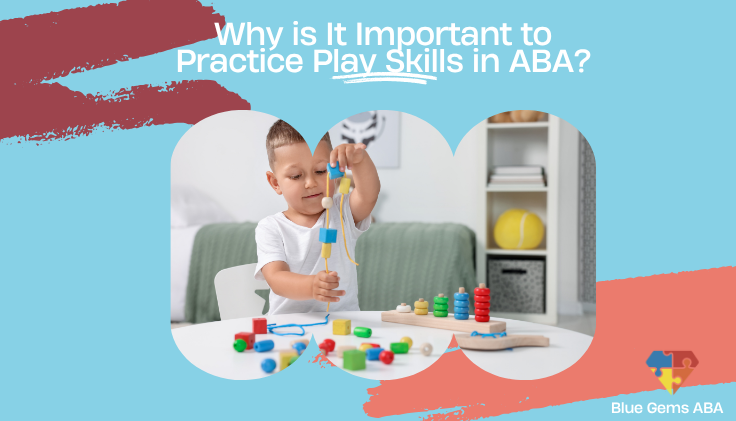Why is It Important to Practice Play Skills in ABA?
Play may seem like a leisure activity that’s fun for children. It’s true, play is something that most children — and even many adults — love to do, but it’s also a very valuable skill that is very beneficial to everyone.
Play isn’t just about fun. In many ways, it’s an extremely powerful tool that can be used for all children, regardless of their developmental abilities.
Applied behavior analysis (ABA therapy), which is considered the leading treatment option for children who have autism spectrum disorder (ASD), uses play as a critical tool for teaching. Play is used in a number of ways to help children with autism build communication and social interaction skills, and learn how to modify certain negative behaviors.
In this article, we’ll discuss why it’s important to practice play skills in ABA therapy, and how it is integrated into treatment plans.
Table Of Contents
Why is Play So Important in ABA Therapy?
It’s extremely important to keep children with autism engaged and motivated if you want to teach them new skills, and have the skills that they learn stick. An effective way to do that is to play with them.
When children with autism play, they are having fun, which is often something they want to continue doing over and over again. This is why play is so effective.
Play is natural for children and enables them to learn while exploring the environment around them. In doing so, it helps to promote emotional, social, cognitive and physical development.
In essence, play is considered to be a foundation for how children on the autism spectrum can learn new skills and behaviors in a way that is both enjoyable to them and motivating at the same time.
What Are Some of the Benefits of Play?
First and foremost, play increases motivation for children with autism. Any time that children are having fun, they are usually much more actively engaged in whatever they are doing.
Not only that, but they are interested in continuing to play, which provides more opportunities for ABA therapists to teach new skills.
Play is also a great way that ABA therapists can teach skill generalization. This means that the skills that are learned during sessions can be carried over and exhibited in other environments and situations.

Ultimately, skill generalization is one of the biggest goals of any ABA therapy plan.
By playing, children can practice social interaction skills in an environment in which they feel supported and safe. This, in turn, helps to instill confidence in them that they can successfully interact with peers.
Finally, play also gives children with autism plenty of chances to communicate with others. This can come in the form of spoken words, hand gestures or other non-verbal forms of communication — all of which are essential to skills to learn.
What Are Some Ways That ABA Therapy Integrates Play?
ABA therapists can integrate play into treatment plans in a number of different ways.
One example is teaching important social interaction skills such as cooperating, engaging in activities with others and sharing. By using play to teach these skills, children with ASD can learn the building blocks of establishing friendships and interacting with some of their peers.
Naturalistic play is a way that therapists can incorporate opportunities for learning into play activities. The therapist will allow the child to lead based on their interests and preferences, and then create natural environments through which they can teach other skills.
Therapists can also create a structured play environment through which they’ll use a toy the child loves or an activity they enjoy to target specific skills of behaviors. They might use the toy, for instance, to teach patients the best way to take turns, follow instructions or even make a request.
Most often, therapists use structured play when they are targeting a specific goal and want to do so in a way that’s both fun and engaging to the child.
| Development Domain | How Play Supports It |
|---|---|
| Social Skills | Sharing, turn-taking, cooperative play |
| Communication | Using language, gestures, or visuals to express needs |
| Cognitive Skills | Problem-solving during pretend play or game rules |
| Emotional Growth | Builds confidence through positive peer interaction and success in games |
| Behavioral Learning | Reinforces positive behaviors and reduces maladaptive responses through engagement |
Blue Gems ABA Uses Play to Teach Skills
Play is a vital skill for children to learn that also opens up the possibility for future learning. That’s why play is integrated as an essential component of ABA therapy treatment programs for children with ASD.
At Blue Gems ABA, we use play-based activities in various ways to help children on the autism spectrum build the social, communication and daily life skills with which they often struggle. We integrate play into every treatment plan, which we craft specifically to each child’s unique strengths, challenges and preferences.
To learn more, please contact us today.




